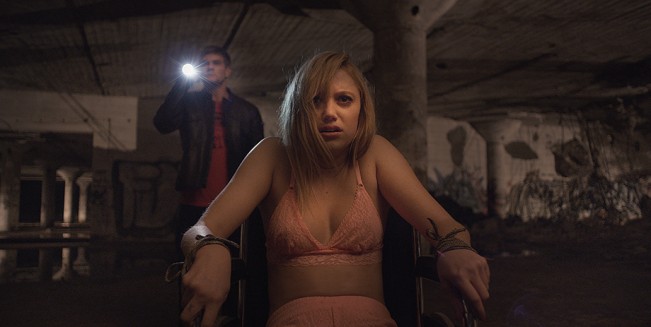By Jake Howell jake.howell@utoronto.ca
The Torontonian reviews It Follows
 One of the most enjoyable aspects of David Robert Mitchell’s It Follows—alongside its brilliant cinematography and chilling scares—is the inventive premise, which is as much to fun to describe as it is to watch (tell your friends about the “sexually-transmitted ghost” movie and watch their faces turn from disgusted to wildly amused).
One of the most enjoyable aspects of David Robert Mitchell’s It Follows—alongside its brilliant cinematography and chilling scares—is the inventive premise, which is as much to fun to describe as it is to watch (tell your friends about the “sexually-transmitted ghost” movie and watch their faces turn from disgusted to wildly amused).
Also appearing in The Guest, another Midnight Madness film at TIFF, Maika Monroe plays Jay, a girl living in Detroit suburbia with her friends and family. Jay’s a typical American girl that likes to go on dates to the movies, and the boy she’s currently seeing is the strong and silent type. They haven’t, well—y’know—yet, but after a bizarre detour and a casual dinner, they finally go somewhere private and get down to business.
Moments after having sex with this dude, Jay is introduced to the “rules” of It Follows: she’s now the target for a haunting spectre that can take many forms—an old woman, a naked girl, a lumbering giant—and will now relentlessly walk towards her until it sees her dead. If it kills her, it will then go up the chain and begin to haunt the person Jay most recently had sex with—in this case, the beau from earlier—making this movie a terrifying game of sexual hot potato. It’s an idea that’s high-concept and low-budget.
Other horror films have ghouls that are more agile than what stalks Jay in It Follows—or faster, for that matter—but Mitchell uses the slow-and-steady ghost premise to chilling effect. In one of the film’s most unsettling scenes, Mitchell sets his camera on a panoramic 360-degree tripod and spins around the hallways of a school as Jay rifles through some yearbook archives to find out who it actually is she just had sex with (her mysterious suitor was not who he said he was, it seems). As the camera repeatedly cycles around, we through a window both a field teeming with people and a hallway with students, but is the ghost outside or in the school? Because Mitchell opts for master shots in establishing his environments, there’s a lot of fun in trying to spot the apparition in his backgrounds, and this scene is one of the creepiest examples of this approach.
In terms of character motivations and oh-my-god-you-know-that’s-a-bad-idea, sure—there are a number of genre clichés and plot holes here, but the film is far too pretty to look at for those things to really matter (and yes, Mitchell answers the glaring question of “why don’t they just hire a prostitute?”). With excellently eerie lighting and an adherence to wide angles, we get a great sense of how even open areas like a park or a beach can remain claustrophobic—especially when you always have to look over your shoulder. There’s also a synth-heavy score by Disasterpeace that adds a thumping presence of dread behind every sequence, and the result is something original and really frightening.















